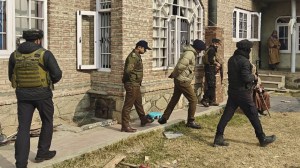Another quota row set to hit state: Maharashtra govt likely to issue GR giving ST tag to Dhangar community before polls
At present, Dhangars are OBCs and in the state they have a separate 3.5% VJNT-C category within 27% OBC reservation.
 For the government, both Dhangars and tribals hold electoral importance. (Express Archives)
For the government, both Dhangars and tribals hold electoral importance. (Express Archives) Ahead of the Assembly elections, the Maharashtra government is likely to issue a government resolution (GR) giving Scheduled Tribe (ST) status to the Dhangar community. But such a move is sure to get embroiled in controversy not only because ruling tribal MLAs led by Deputy Speaker Narhari Zirwal have threatened protests but also because the Bombay High Court in February this year ruled against Dhangars demanding ST tag. The Supreme Court too has rejected the review petitions in this regard.
Chief Minister Eknath Shinde on Sunday held a meeting to discuss the demand raised by the Dhangar community seeking ST status. The community claims that the Dhangad tribe, which has ST status, is identical to the Dhangars and that a “spelling mistake has cost them the ST status”.
After the meeting, state Excise Minister Shambhuraj Desai said, “The Maharashtra government will work towards issuing a GR stating no difference between the Dhangars and Dhangads. But we will also ensure that there will is no injustice against any other community while giving ST status to Dhangars.”
Ruling alliance NCP leader and Deputy Speaker in the Assembly Zirwal, who is a prominent ST leader from north Maharashtra, said, “The Maharashtra government should have consulted us before forming a committee for this (on Dhangar demand). We have not been given any time to present our side. How can any decision be taken about tribal reservation without considering the tribal community?” He said that an all-party tribal leaders will be meeting Shinde next week.
For the government, both Dhangars and tribals hold electoral importance. Out of 288 Assembly seats, Maharashtra has 25 seats reserved for ST community. As far as Dhangars are concerned, the community is presently a part of OBC list and holds presence largely in western Maharashtra with an influence in around 25-30 assembly seats.
Presently, Dhangars are OBCs and in the state they have a separate 3.5% VJNT-C category within 27% OBC reservation. Maharashtra government led by former CM Devendra Fadnavis had announced prior to the 2014 Assembly polls to give ST reservation to Dhangars and, after coming to power, had formed a committee under the TISS on this issue. The report has, however, not been made public yet.
According to Sanjay Dabhade, a tribal scholar and activist working on the issue, “The Bombay High Court in February 2024 rejected the demand of identifying Dhangad as Dhangar. The state government should have known that even the Supreme Court has rejected the review petitions. It is doing nothing but misleading Dhangar community ahead of elections.”
The demand
Constitutionally, every state has its own schedule whereby a list of tribes eligible for reservation is mentioned. Maharashtra has 45 tribes and on number 36, Oraon, Dhangad is mentioned. What it means is, Oraon is the main tribe and Dhangad is its regional name. Maharashtra’s Dhangars claim that Dhangad is a spelling error, whereby they claim that the entry on number 36 is for them. If searched for the origin, then Nagpur, Chandrapur, Gadchiroli and others were part of Central Province and Berar, the STs from Madhya Pradesh were counted in Maharashtra, leading to the entry of Oraon, Dhangad. After Maharashtra became a state, it remained as some of them were working here. Oraon, Dhangads are now found in Bihar and West Bengal only. Maharashtra government has given an affidavit in court mentioning that the state has no Dhangads.
Procedure to expand ST list
SC has stated that it is not the court’s job to change spellings or to accept any community as tribal. Only the Parliament can do it. Not even state legislation. In the case of Maharashtra, the Tribal Research and Training Institute will study the demand for inclusion, will submit a report to the state government, and the cabinet will decide whether to accept it or not. If accepted, the tribal advisory council will study it, and if they accept it, the state will prepare a proposal to be sent to the Centre. After approval from the National Commission for STs, it will go to the Registrar General of India, and then to the cabinet secretary, and once approved it is converted into a Bill to be presented in Parliament for approval.







